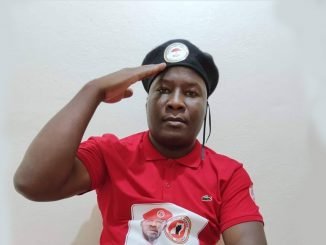
Kampala, Uganda | URN | A group of 11 activists has petitioned the Constitutional Court challenging the new anti-homosexuality law just hours after it was signed by President Yoweri Museveni.
The petitioners challenging the newly signed anti-homosexuality law include; Prof Sylvia Tamale, Fox Odoi Oywelowo (West Budama County MP), Dr Busingye Kabumba, a lecturer of Law at Makerere University, Andrew Mwenda, the proprietor of the Independent News Magazine, Solome Nakaweesi Kimbugwe, a Pan Africanist feminist and activist and Dr Frank Mugisha, coordinator of Sexual Minorities Uganda (SMUG).
Others are; Kasha Jacqueline Nabagesera, former executive director of Freedom and Roam Uganda (FARUG), Richard Smith Luthimbo, the Executive Director of Uganda Key Populations Consortium (UKPC), Eric Ndawula, a human rights activist and Williams Apako, the Executive Director of Tranz Network Uganda and Human Rights Awareness and Promotion Forum (HPRAF) headed by lawyer Adrian Jjuuko.
The law imposes capital punishments on same-sex relations including life imprisonment and death sentence. The law which is largely targeting lesbian, gay, bisexual, transgender and queer people also criminalizes the behaviour including having gay sex when HIV-positive, and stipulates a 20-year sentence for “promoting” homosexuality.
In their petition filed on Monday 29, May 2023, the petitioners through their lawyers led by Dr Adrian Jjuuko said that they are challenging the new law for falling short of the required procedure by failing to include public voices and participation.
“The act was passed without adequate and meaningful public participation. When they are making laws, the public really has to be involved especially the people who are concerned. But we saw during the hearings of the committee and during when the discussions that not even a single LGBT person was basically before the committee to have their views heard and [yet] this is the law that affects them directly.
We’re also challenging the law because during the 2nd and 3rd readings on March 21st and May 7th of 2023, the Speaker’s conduct clearly showed bias. The Speaker clearly made statements that showed that she was in favour of passing this law and yet the speaker is supposed to be basically impartial when handling parliamentary sessions,” said Jjuuko.
They argue that the enactment of the Anti-homosexuality Act 2023 by the 11th parliament on May 2nd 2023 without meaningful and adequate public participation is unconstitutional and contrary to the national objectives and principles of state policy enshrined in the Constitution.
They further contend that by making it an offence for any person to allow or lease or sublease premises to be used for purposes of homosexuality or activities that encourage homosexuality is inconsistent and in contravention of the principle of legality. Further, they argue that criminalizing consensual same-sex sexual activity among adults in private contravenes the right to equality and non-discrimination, right to dignity, right to liberty, and the right to privacy.
The petitioners further contend that sections 11(1) and 2(b) of the Anti-Homosexuality Act 2023 by criminalizing the publication, communication or distribution of any material that promotes or encourages homosexuality is in contravention of the principle of legality, freedoms of speech and expression, freedoms of thought, conscience and belief including academic freedom, the right to impart and access and receive information.
Also, that section 12 of the Anti-Homosexuality Act by prohibiting and disqualifying persons convicted of an offence of homosexuality from employment is in contravention of the right to practice one’s profession or carry on lawful trade, right to equality and nondiscrimination.
The petitioners now want the entire act nullified for having been passed and enacted in breach of parliamentary procedure and in the alternative some of the sections complained of also declared null and avoid.
They are also seeking a permanent injunction restraining the attorney general who has been listed as the only respondent to the case and any of the government agents from implementing provisions of the act.
The attorney general is yet to be summoned to file his defense before this petition can be heard by the panel of five Constitutional court justices.
In 2014, the Constitutional court struck down the previous anti-homosexuality law on procedural grounds after finding that the parliament had passed it without the required quorum.
Prior to the nullification, some Western governments had suspended some aid, imposed visa restrictions and curtailed security cooperation with the Museveni-led government.



